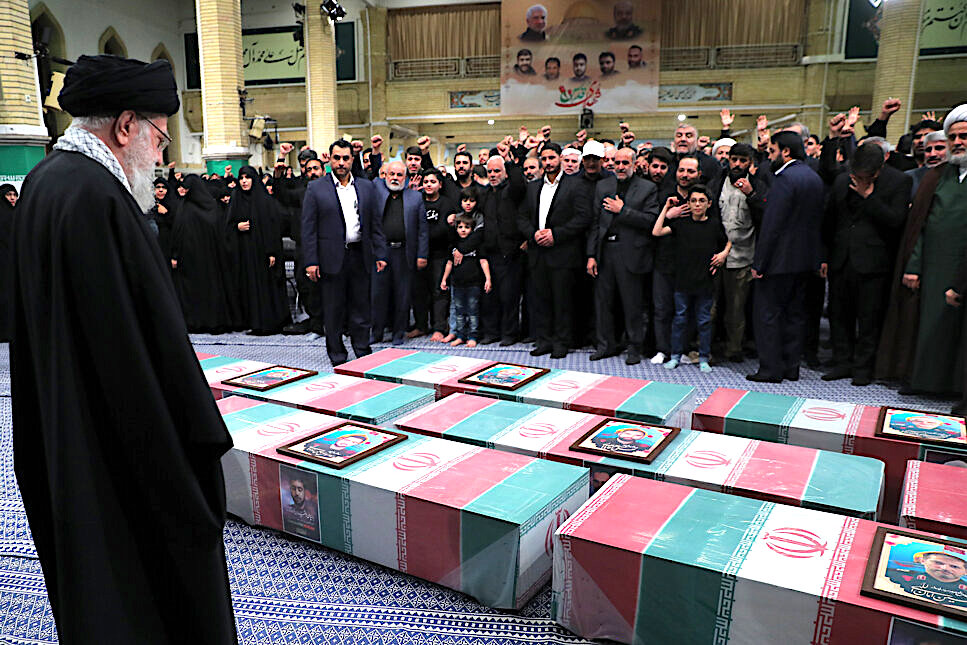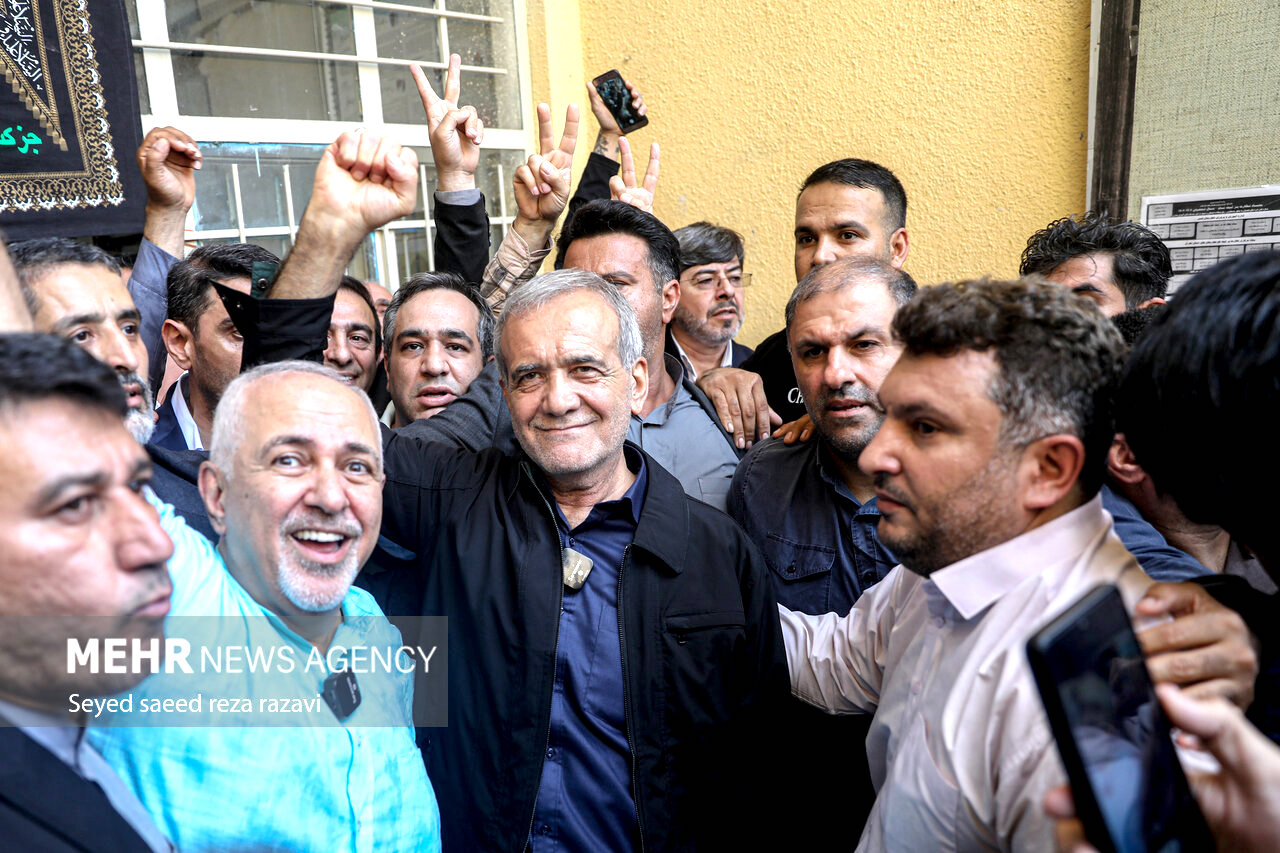Tehran will eventually need to address Tel Aviv, maybe even more so after the pager terrorist attack in Lebanon. But Iran will do so on its own terms, not on the timeline dictated by its enemies.

Ali Khamenei leading the funeral on April 4, 2024, for the IRGC soldiers killed in the Israeli attack on the Iranian consulate in Damascus. (Khamenei.ir, Wikimedia Commons, CC BY 4.0)
By As`ad AbuKhalil
Special to Consortium News
 Iran faces probably its most difficult decision since its 1979 victory in the Iranian Revolution.
Iran faces probably its most difficult decision since its 1979 victory in the Iranian Revolution.
Israel has launched strikes deep into the heart of Tehran and Beirut’s southern suburbs, significantly strengthening its strategic position.
[On Tuesday, Israel was accused by U.S. officials of planting explosives in pagers made in Hungary, which were sold to Lebanon and then remotely detonating them, killing 12 people and injuring more than 2,700. Hezbollah vowed revenge on Israel.]
Before the pager terrorist attack, Hezbollah leader Hassan Nasrallah conceded that the two earlier strikes on Iran and Lebanon were an Israeli achievement, a rare concession from any Arab leader.
But Israel’s bold and risky aggression must be understood in the context of Tel Aviv’s strategic failure to eliminate Hamas in its war on Gaza.
Israel’s Free Hand to Kill
Israel has succeeded in exterminating tens of thousands of Palestinians and rendering much of Gaza uninhabitable. A state that has historically shown little compunction for ethnically cleansing the native Palestinian population in favor of European immigrants, has once again prioritized its occupation’s security over humanitarian concerns and international law.
As long as Israel enjoys unconditional American support, it knows it can violate international norms and laws of war, and perhaps even resort to the deployment of nuclear weapons — with U.S. backing.
Since the assassination of Qasem Soleimani, the former chief of the Iranian Revolutionary Guard Corps, during the Trump administration, Iran has struggled to reassert its sovereignty and project deterrence against Israel.
Iran’s relatively open society presents vulnerabilities, unlike Saddam Hussein’s tightly controlled Iraq, for instance, where foreigners were thoroughly scrutinized or banned altogether. Iran’s tourism industry and dual citizenships have allowed the Mossad to infiltrate Iranian society and to recruit spies and saboteurs.
Several assassination attempts, some successful, have targeted Iranian scientists and regime figures. Additionally, Israel and Saudi Arabia have collaborated to fund and support domestic ethnic opposition groups and the terrorist organization Mujahideen-e-Khalq (MEK), which was previously supported by Saddam Hussein’s regime and is now backed by the Mossad, the Saudi regime, and the Israel lobby in Washington. (The U.S. once classified it as a terrorist organization for its resort to indiscriminate bombings, but Israel managed to have it delisted).
Iran, a nation with diverse ethnicities and religious groups, has long seen its adversaries exploit these internal divisions. These enemies leverage inequalities to stir unrest and recruit spies for the Mossad and other hostile forces.
The U.S., under a president with questionable mental acuity, continues to support Israel unconditionally, even as Israel’s mass violence against Palestinians escalates. There seem to be no red lines for the White House, perhaps even if Israel were to resort to nuclear weapons against its enemies.
Iran does not wish to confront Israel directly while the U.S. is prepared to deploy warships across the region in Israel’s defense. Israel’s need for direct U.S., European, and even Arab military intervention to defend itself against non-state actors in Palestine and Lebanon exposes its own strategic vulnerabilities.
Israel used to be able to take on several Arab armies without external military support and now it cries for help from NATO when threatened by the relatively small armies of Hamas and Hezbollah.
Political Dissent in Iran
The recent Iranian presidential election revealed significant dissatisfaction among the Iranian population. Opposition to the regime is no longer confined to young college students in major cities. In this election, a candidate aligned, openly, with the Iranian Revolutionary Guards faced off against a representative of the so-called reformist opposition, and the latter emerged victorious.

Iran’s President Masoud Pezeshkian voting in the July 5 runoff election. (Mehr News Agency, Wikimedia Commons, CC BY 4.0)
The regime faces a crisis of legitimacy as the revolutionary credentials that once sustained it wane over time. Economic reform and job creation have become the government’s top priorities — more important even than retaliation against Israel.
Furthermore, recent visitors to Iran report strong manifestations of dissatisfaction among the population regarding generous Iranian support for the Palestinian struggle. Many Iranians maintain that the needs of the Iranian people should be prioritized over the military requirements of Arab resistance against Israel.
Foreign policy is a big priority for the regime but less so for the populace, and we should not rule out the possibility that Western propaganda has actually succeeded inside Iran as it succeeded in the former Soviet bloc countries during the Cold War.
Iran under the Shah was not only unconcerned over the plight of Palestinians but the Shah was a very close ally of Israel and helped fund and arm its clients in the region including the Phalange and their allies in Lebanon — as early as 1958 during the mini-civil war (and the later civili war in 1975).
It was Ayatollah Ruhollah Khomeini personally who injected Palestine into the core of the ruling doctrine of the government and even of the religious-political ideology that came to power in Iran.

Khomeini in the 1970s. (Wikimedia Commons, Public domain)
Some elements of the reformist opposition, who are aligned with the duo of former President Hassan Rouhani and former Foreign Minister Javad Zarif, believe that if Iran were to make further concessions, the U.S. will lift the sanctions and usher in economic prosperity.
The Rouhani government operated under this assumption, negotiating a nuclear deal that ultimately did not serve Iran’s interests. Foolishly, they agreed to the pact in the final days of the Obama administration without securing a durable, U.S. Senate-approved treaty. As a result, when Donald Trump took office, he easily dismantled the agreement, despite its earlier endorsement by a United Nations Security Council resolution with U.S. assent.
Iran’s Decision
Iran must take all these factors into consideration when contemplating how to responded to its sovereignty being directly violated by Israel multiple times over the past year — first with the attack on its consulate in Damascus, and more recently with the assassination of a Hamas leader in a government guesthouse in Tehran.
While Iran’s response to the first violation was symbolic but strong, a similar symbolic response to the second could harm Iran’s strategic position with Israel. Iran wants to send a clear message of deterrence but does not want to escalate into an all-out war.
It also naively fears that Israel could drag the U.S. into a military confrontation with Iran.

U.S. Vice President Kamala Harris with Israeli President Isaac Herzog at the Munich Security Conference in February. (Office of the Vice President, Wikimedia Commons, Public domain)
Although it’s possible that a second Trump administration, or the present one, might support Israel in an attack on Iran, it is highly unlikely that the U.S. would participate in a full-scale war against Iran, especially after the failures of recent U.S. military interventions in the Middle East.
As former Defense Secretary Robert Gates famously warned once at West Point, any president who considers starting a new war in the Middle East should have his head examined.
For Iran, relying too heavily on its regional allies to respond to Israeli aggression could damage its standing in the Arab world. It must respond on its own terms, or its regional influence will suffer.
Gulf media outlets have already accused Iran of avoiding direct confrontation with Israel, even though there is no geographical border between the two nations. These same outlets rarely miss an opportunity to undermine support for Iran on behalf of Israel.
This war, involving key Iranian allies Hamas and Hezbollah, is one of the longest in the history of the Arab-Israeli conflict (perhaps with the possible exception of the war of attrition between Egypt and Israel, 1968 and 1970).
While Iran remains the only country willing to risk its own stability and economic well-being to provide military and financial support to Arab resistance groups, there is growing pressure from Arab public opinion for Iran to take more direct action against Israel if it is to benefit from its continued support for the Palestinian cause.
Iran can’t leave its sovereignty violated repeatedly by Israel, in both Syria and Iran. This is a major vulnerability that the “resistance axis” has to address at some point, and probably in coordination with the Russian government, which still remains aligned with Netanyahu over Israeli aggression in Syria.
Iran will eventually need to address Israel. But it will do so on its own terms, not on the timeline dictated by its enemies.
Iran will have to decide: how to protect Iranian sovereignty and strategic deterrence without starting a regional war with Israel and instigating a direct U.S. military intervention against the Islamic republic.
Thus it has little choice but to wait out this period of intense U.S. attention and presence in the waters of the Middle East.
As`ad AbuKhalil is a Lebanese-American professor of political science at California State University, Stanislaus. He is the author of the Historical Dictionary of Lebanon (1998), Bin Laden, Islam and America’s New War on Terrorism (2002), The Battle for Saudi Arabia (2004) and ran the popular The Angry Arab blog. He tweets as @asadabukhalil
The views expressed are solely those of the author and may or may not reflect those of Consortium News.
Please Donate Today to CN’s Fall Fund Drive



I realize that no region wants war but…how much longer are the Zionists going to continue getting away with murder…literally???
Israel continues to defy international law and the basic concepts of diplomacy because Israel is supported without condition by USA who also frequently ignore international law and interfere with the governance of other nations. Tensions between Israel and Middle East nations will diminish once USA decouples Israel from its current foreign policy.
When a radical religious military alliance like NATO goes for full spectrum dominance of world religious,’economic, cultural’ and military world order it just have to wait them out. The ramifications of high technological society on the planet for wasteful military spending versus ecological disasters will make them victims of their own hubris.
Then perhaps a real world order wanting to survive will win out for openness over male dominance protection racket..
“The regime faces a crisis of legitimacy as the revolutionary credentials that once sustained it wane over time. Economic reform and job creation have become the government’s top priorities — more important even than retaliation against Israel.”
The major joint Russian Iranian project, the INSTC, should greatly aid the Iranian economy.
It has always made more sense to me that having Russia and Iran as partners, if not allies, makes infinitely more sense than having as an ally a tiny racist/supremacist ethno-religious state on the Mediterranean which has caused us nothing but trouble since its inception, actually attacked our military (USS Liberty), spies on us with impunity, nakedly influences our government to the detriment of our domestic and foreign policy, buys elections. and pulls us farther away from our founding republican values. Largely because of Israel we have lost our own ethical and moral center. The de-dollarization of the world economy will be the final straw, as we follow Israel to perdition
Johnson set up the Liberty to be attacked. Mosha Dyan against David Ben Gurion vetoed Isarel attacking the Liberty. LBJ wanted an excuse to attack Egypt air force. He needed a military win to be reelected. Vietnam was a disaster.
REMEMBER THE LIBERTY by Phillip Harris goes into detail about the attack.
I’m puzzled by the statement: “the Russian government, which still remains aligned with Netanyahu over Israeli aggression in Syria.” The Russian government has been a major supporter of al-Assad.
Russian and Israeli forces have avoided direct clashes in Syria. Russian air defenses haven’t been mobilized to shoot down attacking Israeli planes or missiles. On the whole, relations between the two countries have remained hospitable. Both have reasons for maintaining the status quo despite military friction. The Israelis appear to have given up on their aspiration of overthrowing the Syrian government, being satisfied with the abject ruin of that country. As for the Russians, they always proceed towards confrontation cautiously, while seeking alternatives- unlike the U.S.
Re: Hall
Thank you for your take. Your explanation is in stark contrast to Mr. Abu Khalil’s vague wording, which assumes your understanding of the relationship, if it indeed accords with his, is commonplace.
There seems to now be another question of sovereignty, that of Hungary. Either the Hungarians were acting in concert with Israel in installing explosives into those pagers, or they were hijacked to assist Israel unwillingly, and unwillingly. In the first case, they would have been in violation of several of their obligations under EU, and International Law, not to mention interjecting NATO into Israel’s war against Lebanon. There might need to be some reckoning on this. If the second case, then Hungary needs to take a stand for their own sovereignty, and against their country being used in this way. I’ll be very interested in seeing how Orban plays this. Either way, Hungary needs to be feeling the pressure.
Zoltán Kovács, a spokesperson for the Hungarian prime minister, said on X that authorities have confirmed that BAC Consulting was a trading intermediary that was not manufacturing or operating in Hungary and that “the referenced devices have never been in Hungary.”
Maybe it’s just this tired, aging mind of mine, but I find this article to be very confusing, lacking in clarity. Here are 2 examples among many:
1. “Gulf media outlets have already accused Iran of avoiding direct confrontation with Israel, even though there is no geographical border between the two nations.” Huh? Iran has already proved with its retaliatory missile strike against Israel that the importance of a common geographical border makes no sense.
2. “…the Russian government, which still remains aligned with Netanyahu over Israeli aggression in Syria.” Russian government aligned with Netanyahu??? Double “Huh?”
I think what must concern the Americans is being drawn first into war by either Israel or Ukraine, then being drawn into the second war purposely to split its manpower, weapons, intelligence sources and so forth. America wouldn’t be in one war on two fronts, it would be in two wars. The opposing sides are allied, however, and for them after years of belligerence from America they could approach this as one war on two fronts.
It may be that America views Israel’s security as more important so they may throw Ukraine under the bus. They would hope Russia goes on to take Ukraine and doesn’t assist Iran too much, but that will run the risk of Ukrainian neo-Nazis becoming so embittered they resort to terrorism on mainland America, in revenge for what they would consider an egregious betrayal. And America-Israel could still lose.